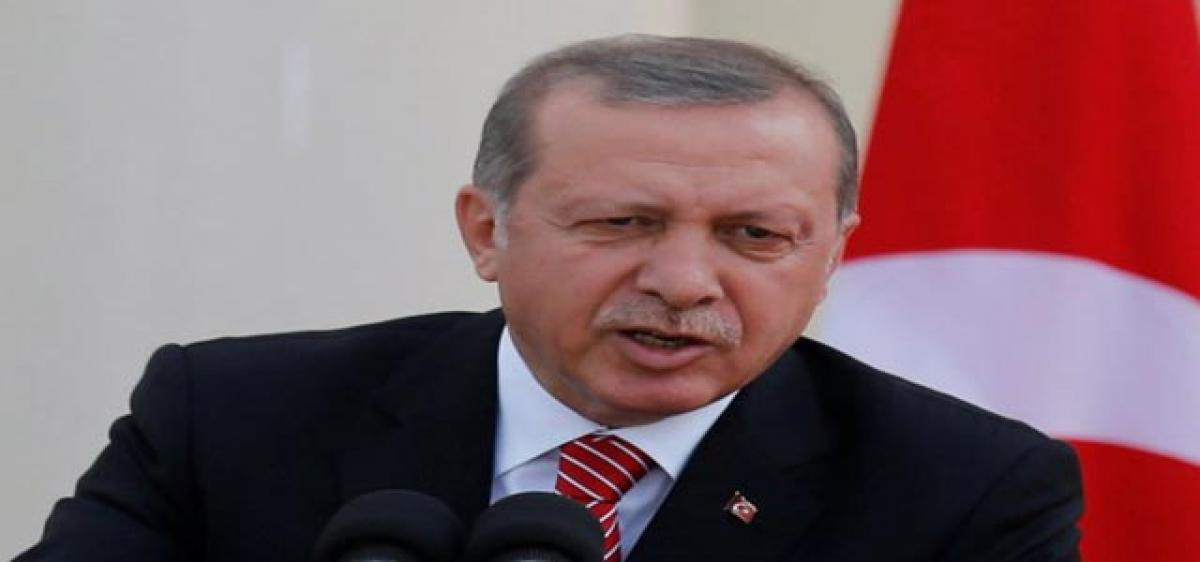Live
- ‘Get Set, Grow Summit 2024’ Focuses on Digital Detox for Families
- Stokes motivates his team to put in extra effort, says England pacer Potts
- From overcoming setbacks to leading India in U19 Women’s Asia Cup, Niki Prasad's amazing journey
- Driving Enterprise Security: Inside Venkata Reddy Thummala’s Leadership Journey
- Constitution debate: PM Modi hails 'Nari Shakti'; makes strong pitch for 'United Bharat’
- Abhijeet Bhardwaj: Revolutionizing Enterprise Analytics with Innovation and Expertise
- Bihar: Inquiry initiated against principal who went to buy veggies during school hours
- Press Sri Lankan Prez for release of Indian fishermen: TN Cong MP to EAM Jaishankar
- TN: DMK postpones executive meet due to heavy rains & Parliament session
- Porous silicon oxide electrodes can fix durability issues in batteries: Researchers
Just In

In the referendum held to bring about massive changes in executive and legislative mechanisms of Turkey on Sunday, President Erdogan clinched victory with a narrow margin.
In the referendum held to bring about massive changes in executive and legislative mechanisms of Turkey on Sunday, President Erdogan clinched victory with a narrow margin. The referendum which calls for abrogation of the post of Prime Minister will mark the end of Parliamentary system of democracy in Turkey. The duties of Prime Minister will be subsumed under the title of President of the country.
Turkey which is considered as the bridge between Europe and Asia has been the talking point in the recent past for dubious reasons. Be it marked abrasions in the bilateral ties with the US, refusal to allow NATO troops to use its airbase, shooting down of Russian fighter plane for alleged violation of airspace, unceremonious assassination of Russian envoy in Ankara, pulling out troops from Syria, foiling coup bid and purging of huge chunk of officials from plum posts in administration, the country is going through tumultuous phases.
These colossal changes besides altering the geopolitical equations in the Middle East, have invariably demonstrated Turkey’s progression from a parliamentary form of democracy to an authoritarian regime. The archaic shift in Turkey is undeniably steered by the leader of the Justice and Development Party (AKP) of Recep Tayyip Erdogan.
Turkey, unlike the Ottoman Empire, was carved on modern lines by the founder Mustafa Kemal, also called Ataturk. Inspired by the tenets of democracy, he diligently transformed the nation ruled by Sultan into a modern state. He exquisitely assigned the powers of administration to legislature, constituting the elected representatives and executive branches. This unique framework has set apart Turkey from other Asian countries in the region.
The cosmopolitan approach in governance emulating Western values kept Turkey in a good stead from its inception in 1921 until the current referendum. This referendum marks the annihilation of Ataturk’s vision for modern state of Turkey. Secularism and Democracy, the main pillars of Turkey are now teetering under the burden of Islamists who steadily strangulated all aspects of governance since 2001.
The early seeds of antipathy towards the two guiding principles of modern day Turkey were planted as early as 1960s by Necmettin Erbakan. This movement gradually caught the attention of Islamists who strived hard to veer Turkey from the West and led to genesis of Erdogan’s AKP party.
Despite being hardcore Islamist at heart, Erdogan strived to obtain EU membership. But his attempts never fructified. Though Erdogan initially feigned to be a modernist, being a traditional Islamist to the core, attempted to make course corrections to have unrestrained power.
Erdogan rose to higher echelons of powers in 2003 and served as Prime Minister till 2014. He won presidential elections of 2014 and hence forth asserted great control over all aspects of governance. In June 2016, he foiled a coup bid and smartly decimated opposition through great purge.
AKP with support of Nationalist Movement’s Party (MHP) jointly passed a bill to reform Constitution setting the stage for a referendum on constitutional reforms in April. The reforms intend to dissipate checks and balances on the functioning of the President endowing him unbridled power making him modern-day Sultan with limited term.
He will have sweeping powers to appoint judges and cabinet, declare state of emergency, dissolve parliament and pass new laws through decrees. Parliament can no longer scrutinize actions of President. New term limits will be set. If Erdogan wins elections in 2019, he will continue as President till 2029.
Exploiting people’s fear of political instability, Erdogan lured them to vote for constitutional reforms promising strong and stable government.
Republic of Turkey in 94 years of existence had 65 governments. Many international organisations and European governments expressed serious concerns about Turkey’s future and its commitment to democratic principles.
With his inimical attitude, Erdogan had already ruffled feathers with Europe. Turkey’s chances of getting into EU are now almost zero. Turkey might even renege on refugee deal with EU and relations with US nosedived over support to Kurdish rebels.
But NATO can hardly afford to disown Turkey for its strategic geographical position. Turkey with 6,20,500 armed personnel has the second largest armed forces in NATO after the US. More so, with situation in Syria deteriorating further, US had to keep Turkey on board. Erdogan will now strengthen defence and security cooperation with Russia.
In January Turkey collaborated with Russia and Iran for arranging peace talks between Syrian rebels and government officials at Astana. Turkey might now openly consolidate ties with Russia. With an authoritarian President at the helm of affairs, observers allude that Turkey will be ushered into an era devoid of Kemalist ideas.
By Ramaharitha Pusarla

© 2024 Hyderabad Media House Limited/The Hans India. All rights reserved. Powered by hocalwire.com







